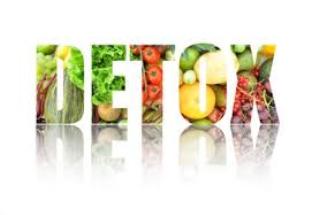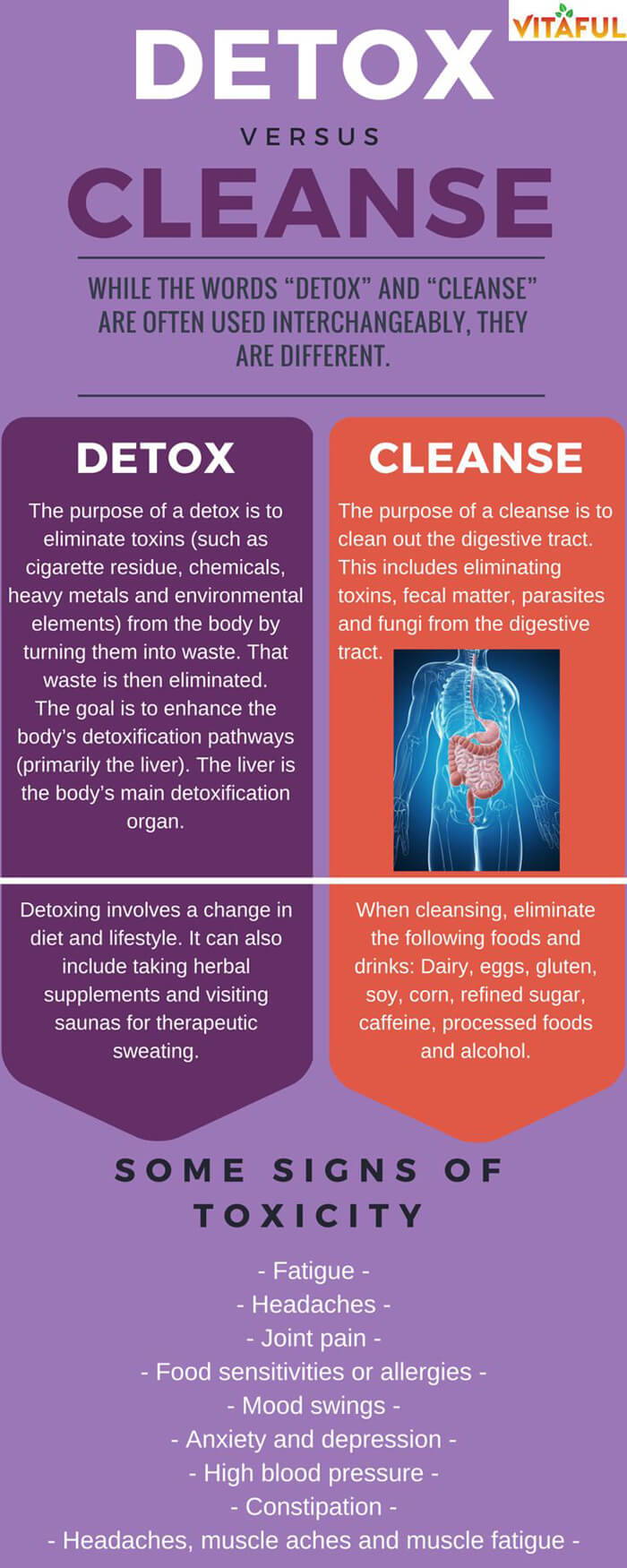There is a fair share of misinterpretation about what a detox is and how to go about it, so let us explain how we understand detoxification.
Detoxification is what your body does naturally to neutralize, transform or get rid of unwelcome materials or toxins. It is a primary function of the body, continuously working and interacting with all other functions of the body. In other words, when we are talking about detoxification, it is about improving and heightening the function of your body’s own detoxification systems. This is done by lessening the amount of toxins we put into our bodies while at the same time supporting our body’s detoxification and elimination systems with the nutrients it needs to function properly.
The practice of detoxification is not a modern custom. Cultures throughout history have implemented internal cleansing through fasting, the use of herbs, certain foods, enemas, and various colon and liver-cleansing substances. But it’s only in the last few decades that detoxification has become more popular in the mainstream.
Misleading and muddled information about detoxes and cleanses has flooded the Internet, promising a variety of difference results. If you are looking for a healthy, natural way to get back on track, check out the information below and click HERE.
Let us now focus on the question: are there any differences between a cleanse and detox?
The short answer is, there is no agreed upon definition of either term. They’re commonly used interchangeably (which is how the terms will be used in this discussion for the most part).
A slightly longer answer is, some health care practitioners do distinguish between the two, labeling a detox as being more targeted to removing an unwanted (and specific) waste product or matter from the body. In such cases, a detox may be advised after exposure to chemicals such as pesticides, immoderation in alcohol, use of certain medications, or similar situations.
On the other hand, a cleanse provides more universal support for the organs of detoxification, including the colon, liver, and kidneys, without a specific target for removal from the body.
What exactly does a cleanse or detox involve?
There are a great many types of cleanses/detoxes. For the best part, though, they usually involve a mixture of different dietary recommendations, herbal products, and lifestyle changes. In some circumstances this also includes a period of fasting or the ingesting of liquids only.
What would you do with $500? Sign up for one of LFBT & Healthline’s free e-News & Tips to enter! »
What is a Detox Program?
Experts call the total amount of toxins stored in the body at a given time our toxic “body burden.” They note that when our total body burden passes a definite point, organs of elimination slow way down, kind of like your water filter when you haven’t changed it for a while.
As I mentioned before, detoxification is a metabolic process that converts the toxins in our bodies into waste. That waste is then eliminated, and that activity can be tough on us. The purpose of a detox is to ease the release of toxins from our fat storage cells in order to enhance the body’s detoxification pathways (particularly the liver).
With that in mind, the best way to detox is to support these indispensable organs to work at their ideal level. This can be done by intaking herbs that accelerate the function and elimination process, such as milk thistle or dandelion root. We can strengthen the function of these organs by making more lasting dietary and lifestyle changes – upping fruits and vegetables in our diets, especially sour or bitter foods, and increasing our intake of healthy fats such as avocado and olive oil which support the liver in detoxing.
Natural herbal products support the main organs of waste removal, such as fibre and probiotics for the colon, and herbs and/or nutrients to progress the metabolism of waste products through the liver. Rest and relaxation are recommended, as well as activities that help to support waste removal from the body, such as infrared saunas, skin brushing, or colonics.
A detox program typically works to get rid of toxins like heavy metals, chemicals, cleaning solutions, cigarette residue, and other environmental elements from our bodies. Doctors often recommend a detox once or twice a year, due to our overexposure to toxic components in our homes and surroundings.
When you detox you will possibly want to exclude meat and definitely evade processed foods. Instead, replace those foods with fresh fruits and vegetables. An emphasis on the right foods that provide the vitamins, nutrients, and antioxidants that the body needs for detoxification. A focus on the right proteins. An emphasis on special foods which aid the liver’s detoxification pathways. An emphasis on foods which aid in the movement of bowel motions, such as high fiber foods and water that draw out and eliminate toxins by increasing the regularity of bowel movements and urination.
What is a Cleanse Program?
The purpose of a cleanse is to clear out the digestive tract. A cleanse is a way to support and enhance your body’s natural detoxification system. By eliminating toxic, compacted fecal matter, parasites, and fungi, we can leave our bodies sparkling clean. In order to go about a cleanse correctly, it is vital to clean up your diet and lifestyle (just like in a detox), which means more rest, some gentle and soothing exercise, and a healthy regime of herbal supplements to fully remove any toxic accumulation in your body.
A cleanse is often a milder way of releasing toxins, often by adopting a simpler diet for a period of time. A real cleanse will aim to provide nourishment for the body. By providing food in the form of a whole protein, we can alleviate our blood-sugar levels and allow ourselves to enter a state of deep cleansing and healing.
As a cleanse objectifies cleaning out the digestive tract we would need to make diet changes. This means you will have to remove all food allergens, such as gluten, soy and dairy. You will also need to avoid processed foods, sugars, caffeine and alcohol. Instead, stick to organic, whole foods. And again it offers general support for the organs of detoxification, including the colon, liver, and kidneys, without a precise target for removal from the body.
Some cleanses, for example, aim to retune the digestive system through the implementation of a “mono-diet”. By eating the same meal three times a day over three consecutive days we allow our digestive systems a chance to heal, while simultaneously soothing and mending the gut lining and intestinal walls.
Cleansing and Detoxing Doesn’t Mean You Have To Starve Yourself
If you’ve ever heard anyone talk about their detox or cleanse plan, they may have talked about eliminating food completely. Many people believe in order to detox or cleanse their body then they have to famish themselves. While there are some detoxes and cleanses that limit a person’s diet to merely liquid. But not all detoxes and cleanses are done that way. In fact, some people contend against a fasting or only-liquid cleanse/detox plan because it could cause vitamin deficiencies.
However, before starting on any kind of detox, it is recommended you meet with a health care practitioner in order to ensure that a detox is the best step for you. If you have a significant health history, are taking medication, or have unusual symptoms, it is especially important to have these reviewed before starting any type of detox.
In conclusion: Both cleansing or detoxing is a practice of eradicating toxins from the body with specialized programs. It characteristically includes herbs, fresh juices and cleansing foods, along with flushing the colon with enemas or colonics. A solid detoxification program will remove toxins, drug residues, heavy metals, acid, parasites, fungus, yeasts and other pathogens.
In the long run, those who take care of the stability of their body should expect to live longer and healthier, encounter fewer deteriorating health conditions and tenacious medical problems such as all forms of diabetes, joint disease, and many forms of cancer, convalesce more quickly from sickness and injury, and in some cases some of these conditions may actually vanish entirely.
Toxicity may be related to many health concerns.
Proper assessment is important to optimizey your health.
You can use this QUISTIONNAIRE
You may also like:
Body Detox And How To Choose The Right Kind!
The Healing Crisis Or Herxheimer Effect. The Side Effects During Detox
The Most Common Ways Of Interacting With Toxins
12 Health Benefits Of Detoxing The Body
How Do Toxins Affect Our Body? Six Phases Of Intoxication
What Are The Signs And Symptoms Of Toxicity?
Understanding Toxins and Toxicity





